Women Entrepreneurship in Digital Economy
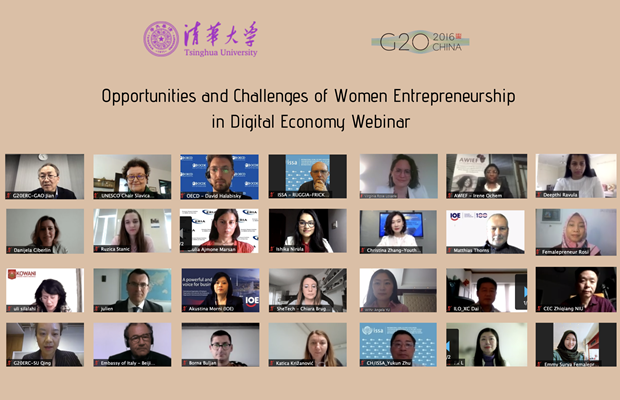
Gender equality and digital economy are key words of this year's G20 labor and employment meeting. With the advent of the digital economy era, advanced digital technology provides more diversified options for employment and entrepreneurship. On the other hand, it is necessary to consider how to narrow the gender gap of entrepreneurship and employment in the digital age.
In order to implement the G20 Action Plan on Entrepreneurship with high quality and support women entrepreneurship in the digital economy within the framework of the G20 Action Plan on Entrepreneurship, the Entrepreneurship Research Center on G20 Economies held a working webinar on April 28, 2021 with the theme of "Opportunities and Challenges of Women Entrepreneurship in the Digital Economy".

Professor Gao Jian, Director of Entrepreneurship Research Center on G20 Economies, started his opening remark with the introduction of the Center's work in supporting women entrepreneurship and gave an overview of women entrepreneurship in the G20 economies. He stated that 44% of early-stage entrepreneurs in the G20 economies are women, slightly lower than men, with women aged 25-34 being the most active in entrepreneurial activity, and education level is directly proportional to entrepreneurial activity. Women's startups are mostly concentrated in retail and service industries, with a low share in ICT. Women show higher levels of lack in confidence and fear of failure than men, and have fewer access to financing than men.

Mr. Raul Ruggia Frick, Head of Centre for Excellence Knowledge at the International Social Security Association (ISSA), said that the digital economy brings some opportunity, such as accessibility, flexibility, globalization and digital transformation of social security, but challenges are still coming in labor and social protection, sustainability and collection of contributions, digital divide and data protection, and institutional readiness. The shock impact of the covid-19 fostered digitalization on the one hand, but raised inequality on the other hand. He also mentioned in his presentation that the digital platform work, as a new form of employment, its coverage of social security is now in urgent demand.

Ms. Virginia Rose-Losada, the Global Coordinator and Lead Officer for the ILO’s Women’s Entrepreneurship Development Programme, shared some cases of women entrepreneurs from Indonesia and Tanzania of using digital information technology in their startup. She cited ITU data (2019)that 3.6 billion people worldwide are still "unconnected," with 52 percent of women and 42 percent of men remain totally offline. In some low- and middle-income countries, women are 26 percent less likely to use mobile internet than men.
In terms of policy recommendations to foster opportunities, she said women should not only own digital tools, but understand the access; understand how women entrepreneurs make use of ICTs; encourage more women to join in training to gain technical and business knowledge and skill; help financial and non-financial services provider understand how to better service women entrepreneurs; policies are needed to enable women greater access and ownership of ICT as well as entrepreneurship.
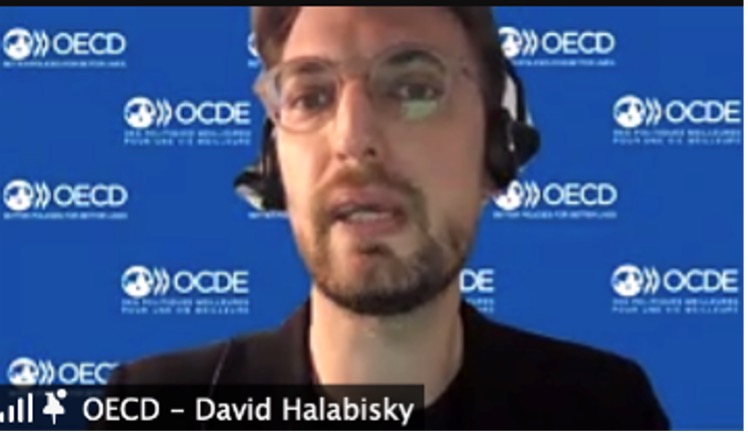
Mr. David Halabisky, OECD Economist on inclusive entrepreneurship and entrepreneurial skill, points out that the gender gap in entrepreneurship has tended to narrow, but has changed very slightly. The main reason for the gap may be, first of all, the result of a long-standing social distribution of labor, with women taking up more energy in caring for the family and children. For the use of digital tools, the situation in EU countries is that the gender gap decreases in the higher education group and increases in the older age group. Women entrepreneurs use ICT more for communication and men more for business management. During the epidemic, as to the business closure rates, women-led businesses were more likely to close, mainly because women-led businesses are likely to be more in the fields that are heavily affected by the epidemic, but also because the epidemic has caused an increase in women house work, e.g., children who are home-schooling.
David’s policy recommendations for governments include: to ensure that women entrepreneurs can access to the Covid-19 support, and continue to transfer entrepreneurship initiatives online, increase offers of digital training and support infrastructure and ecosystems for women entrepreneurship, including networks.

Professor Slavica Singer, UNESCO Chair in Entrepreneurship Education, J.J. Strossmayer University in Osijek, Croatia, cited data from the World Economic Forum in her speech: The global gender gap in economic participation and opportunity, educational attainment, health and survival, and political empowerment decreased by 0.16% from 2006 to 2020, and at this rate, it will take another 267.6 years to close the gap completely.
Between 2010 and 2020, 131 countries issued 274 laws to promote gender equality, but in terms of digital strategies, gender equality was rarely mentioned, and attention was not enough. She emphasized that there is an inequality trap, the focus should be on value creation rather than income distribution.
In terms of policy recommendations, she said that digitization will help close the gender gap, but requires policy interventions: to analyse consistency and inter-connectedness of policies on t digitization and gender gap; to replace fragmented policies with clear integreated approach toward closing gender gaps in all aspects of economic, political and social life, and indentify consistent statistical monitoring of the process of closing gender gaps on the country level, related to UN SDGs.

Ms, Akustina Morni, specialist on women empowerment at the International Organization of Employers (IOE), mentioned that digital economy offers women the avenue to display competencies and increase employment opportunities. Design, access, use and ownership of digital tools may not be gender-neutral. Root causes include hurdles to access, affordability, education and the lack of technological literacy as well as inherent biases and socio-culture norms.
Her policy recommendations include: encourage more women to take up STEM fields at an early age and offering equal access to STEM fields at universities and in recruiting companies, change cultural norms and gender stereotyping that typically assign specific fields and roles to women. It is essential for governments to offer affordable Internet in order to eliminate this obstacle and allow women talents to harness their potential in the digital economy. Foster women’s financial inclusion empowers women and make them able to manage risk, to start up business and encourag women to use digital platforms to start their own businesses.
Several representatives of women's entrepreneurship organizations and incubators from G20 countries also shared their commercial models and case of supporting women's entrepreneurship.

Ms. Chiara Brughera from SheTech incubator in Italy introduced SheTech's support for women entrepreneurs through education, empowerment, and networking, and also organizes regular events, for example, female founder dinner and bootcamp.

Ms. Deepthi Ravula's incubator WEhub, in India is a Government of Telangana initiative for promoting and fostering Women Entrepreneurship in Telangana and across India. She illustrated how to create opportunities in the digital era for women entrepreneurs, including ensuring access to financial and digital literacy and supporting women entrepreneurs to enter and scale with a global footprint, etc.
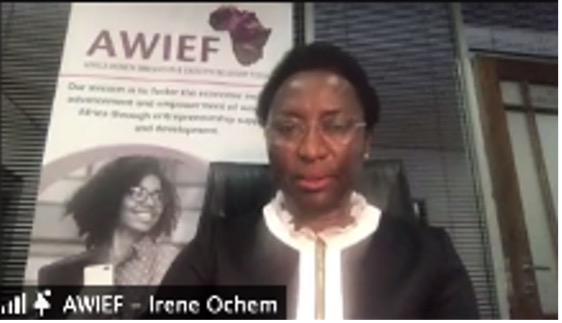
Ms. Irene Ochem from the South African Women's Innovation and Entrepreneurship Forum which is a pan-African women economic empowerment organization with aims to close the gender gap in entrepreneurship in Africa. She describes the Forum's efforts to promote women's entrepreneurship through conferences, awards, accelerator program, networking, advocacy, and digital portals.
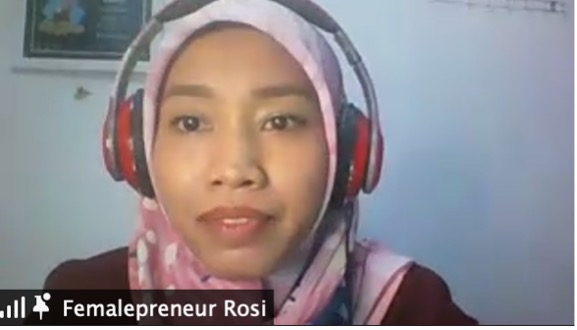
Ms. Titiq Rosmiati from Indonesia runs Femalepreneur, an incubator for women, which provides systematic support for women entrepreneurs mainly through curriculum, media, practical learning, mentoring and support system, with go modern, go digital and go global as her goal.
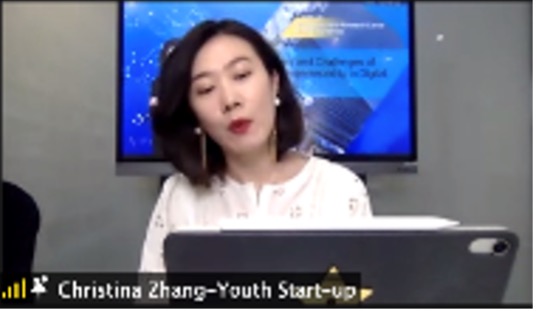
Ms. Christina Zhang, founder of founder of Youth Start-up, introduced the business model of WeChat platform entrepreneurship. She mentioned that Youth Start-up has helped nearly 20,000 entrepreneurs start up their business with WeChat, 90% of which are female entrepreneurs.

Ms. Ishika Nirula, from India, is the Founder of Women in Business Network, a one-year-old organization that supports female college students in their entrepreneurial endeavors. Since its inception, it has already organized some events such as women entrepreneurs' days, business plan competitions, and etc.

Ms. Angela Yu from World Intelligence Incubator Network, China, a female entrepreneur who provide incubation service for entrepreneurs, introduced how WIIN empowers the start-up industry and responds to the changes in the digital economy. She also said that the lack of data and research on women's entrepreneurship mentioned by the experts had triggered her thinking, and said WIIN would attach more importance to data and research of women's entrepreneurship in the future.

Giulia Ajmone Marsan from the ASEAN and East Asia Economic Institute shared some of her views: the digital economy does provide good opportunities for women, but how to foster these opportunities is a question to think, and upgrading digital skills is key factor. She also mentioned the lack of data for the research on women entrepreneurship in the digital economy.
Professor Gao Jian extended his sincere appreciation for all the presentations. He said that this seminar is the first step and the Entrepreneurship Research Center on G20 Economies will continue to build an exchange platform for in-depth communication and interaction among all parties and provide effective support for the development of women's entrepreneurship in the digital economy. Senior officials from ILO and IOE, officials from G20 Ministries of Labor and Employment, G20 Embassies in Beijing, the Ministry of Human Resources and Social Security of China, the China Enterprise Confederation, the China Academy of Labor and Social Security, and the China Chamber of International Commerce join the working webinar as well.